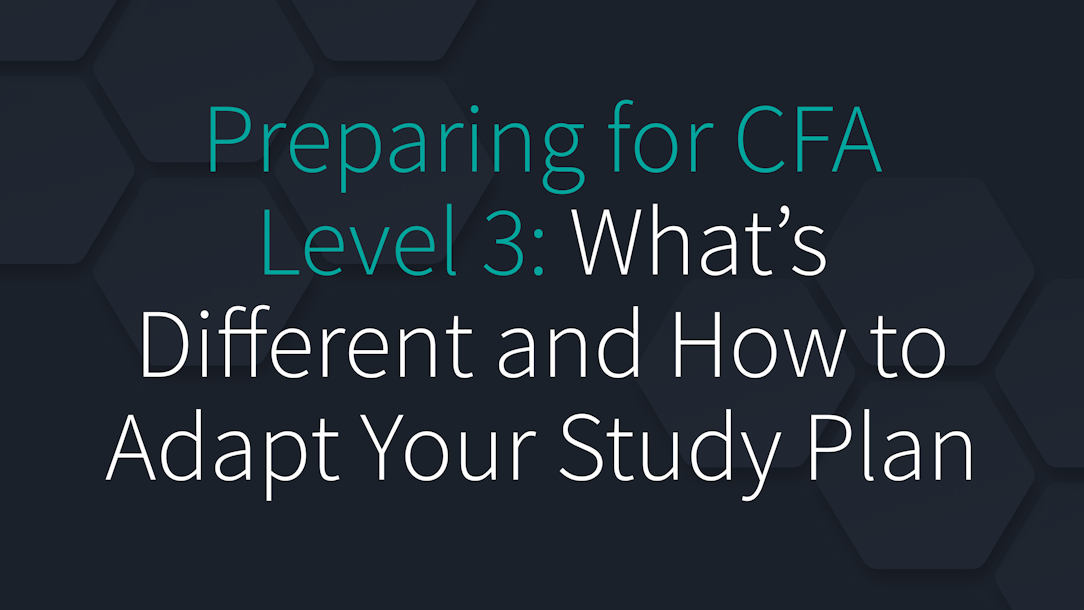
Preparing for CFA Level 3: What’s Different and How to Adapt Your Study Plan
CFA Level 3 is a different beast compared to earlier levels. The shift towards application-based learning, constructed responses, and portfolio management principles requires candidates to adapt their study strategies.
CFA Level 3 is the final hurdle before earning your charter, but don’t be fooled into thinking it’s the easiest. Unlike Levels 1 and 2, which emphasize recall and analysis, Level 3 is all about application and synthesis. The shift in exam format, particularly the introduction of constructed response (essay) questions, requires a strategic approach to studying.
To succeed, candidates need to adapt their study plans, refine their time management strategies, and master the art of structured responses. This guide will help you navigate these challenges and build a winning study plan.
Understanding the CFA Level 3 Exam Format & Structure
CFA Level 3 consists of two key sections:
- Constructed Response (Essay) Questions – This section tests your ability to articulate investment strategies and justify portfolio decisions in written form.
- Item Set (Vignette-Based) Multiple-Choice Questions – Similar to Level 2, this section presents case studies with multiple-choice questions that require critical thinking.
Unlike previous levels, rote memorization won’t be enough. Level 3 demands clear, concise, and well-structured answers, making it a completely different challenge.
Key Differences Between CFA Level 2 and Level 3
- Less Quantitative, More Conceptual – The focus shifts from calculations to applying financial concepts to real-world scenarios.
- Portfolio Management-Centric – While Level 2 emphasizes asset valuation, Level 3 integrates portfolio management and wealth planning at its core.
- Justification-Based Questions – Instead of selecting the correct answer, you must explain why a decision is correct or incorrect in the essay section.
Mastering these differences is key to passing the exam.
Adapting Your Study Plan for CFA Level 3 Success
- Reallocate Study Time – Spend more time on written responses instead of drilling formulas.
- Practice Writing Early – The essay section is where most candidates struggle. Start practising constructed response questions as soon as possible.
- Use CFA Institute’s Past Essay Questions – The CFA Institute releases previous essay questions. Practising them under timed conditions is crucial for mastering the response format.
A well-structured study plan ensures balanced preparation across all sections.
Mastering the CFA Level 3 Constructed Response (Essay) Section
The essay section is not about writing long paragraphs—brevity and precision are essential. Here’s how to excel:
- Follow the Command Words – If a question asks to “justify,” explain why, rather than just stating an answer.
- Bullet Points Over Paragraphs – Concise, direct answers score better than lengthy explanations.
- Time Yourself – Allocate ~15 minutes per question, ensuring you don’t spend too long on any single response.
Essay practice should be a core part of your study plan—waiting until the last few weeks to start practising is a costly mistake.
Optimizing Practice with CFA Level 3 Item Sets & Multiple-Choice Questions
Though similar to Level 2, vignette-based MCQs require deeper analysis:
- Understand the Portfolio Context – Every question links back to broader portfolio management principles.
- Extract Key Information Quickly – Avoid reading every detail—identify the most relevant financial data.
- Refine Time-Saving Techniques – Many candidates struggle to finish the exam; learning how to quickly process complex case studies is critical.
Since the MCQ section still contributes 50% of the exam score, it must be as much of a priority as essays.
Time Management Strategies for CFA Level 3 Preparation
- Start Early – The essay section requires months of practice, not weeks.
- Allocate Study Time Effectively – Aim for a 50/50 split between essay and item set practice.
- Simulate Exam Conditions – Take full-length timed mock exams to build endurance.
Time discipline is essential—candidates who run out of time on essays rarely pass.
The Role of CFA Curriculum & Third-Party Study Materials
- The CFA Institute curriculum is crucial for Level 3, as essay questions are often based on official material.
- Third-party study notes and summaries help distil complex topics, making review more efficient.
- Mock exams and adaptive Q-banks provide the necessary exam-day simulation.
Using a mix of official and third-party resources ensures a comprehensive study experience.
Common Pitfalls & How to Avoid Them
- Underestimating the Essay Section – The CFA Level 3 constructed response format is unlike anything in previous levels—ignoring it is a mistake.
- Overloading on Theory, Ignoring Application – Memorizing material without practising how to apply it in investment scenarios leads to failure.
- Lack of Mock Exam Practice – The best way to gauge readiness is by taking at least 3–5 full-length mock exams.
Avoiding these mistakes significantly increases your chances.
Exam Day Strategy: How to Approach CFA Level 3 with Confidence
- Start Strong – Tackle essay questions confidently; don’t leave them blank.
- Stick to Time Limits – If you’re stuck, move on and come back later.
- Trust Your Preparation – Overthinking can lead to second-guessing and wasted time.
Going into the exam with a clear strategy can make all the difference.
Conclusion
CFA Level 3 is a different beast compared to earlier levels. The shift towards application-based learning, constructed responses, and portfolio management principles requires candidates to adapt their study strategies. The key to success lies in structured preparation, consistent essay practice, and full-length mock exams.
At Salt Solutions, we specialize in CFA Institute-validated study materials designed to help candidates conquer Level 3. Our CFA Level 1, CFA Level 2, and CFA Level 3 prep courses offer a comprehensive approach to exam success.